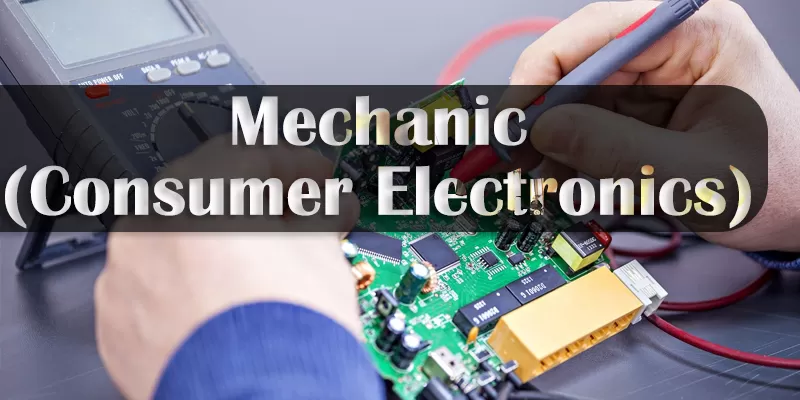
ITI Trade: Mechanic Consumer Electronics
The ITI trade Mechanic Consumer Electronics is a job-oriented training program powered by NCVT (National Council for Vocational Training). This trade is designed to provide trainees with practical skills and technical knowledge in the installation, maintenance, troubleshooting, and repair of a wide range of consumer electronic appliances and devices.
The trade is aimed at fulfilling the industrial requirements of Indian industries as well as international markets, making it an excellent option for those seeking employment in the government and private sectors or looking to become self-employed in the electronics service industry.
🔧 Course Overview
- Trade Name: Mechanic Consumer Electronics
- Powered by: NCVT (National Council for Vocational Training)
- Course Duration: 2 Years (4 Semesters)
- Eligibility: 10th Pass (varies as per institute norms)
- Mode of Training: Theoretical + Practical (Hands-on training on various consumer electronic devices)
- Field: Electronics, Maintenance & Repair, Consumer Goods Technology
🎯 Job Role & Responsibilities
After successful completion of the Mechanic Consumer Electronics trade, candidates are qualified to:
- Install, maintain, and repair consumer electronic appliances such as LED TVs, refrigerators, air conditioners, washing machines, microwave ovens, and more.
- Troubleshoot and rectify faults in electronic devices at the component and module level.
- Assemble, install, and maintain audio/video systems, home theater systems, and personal entertainment devices.
- Repair and calibrate communication equipment, radio/TV receivers, and satellite reception equipment.
- Understand and work on digital electronics, microcontrollers, embedded systems, and home automation technologies.
- Provide after-sales service, technical support, and customer training for efficient device usage.
- Interpret and follow circuit diagrams, service manuals, and technical documents.
🚀 Learning Outcomes
Generic Learning Outcomes
- Recognize and comply with safe working practices, environment regulations, and proper housekeeping.
- Work effectively in a team, communicate using technical English, and practice soft skills for better customer interaction.
- Apply basic mathematical and scientific concepts related to electronics in practical operations.
- Understand and read engineering drawings, circuit diagrams, and specifications for electronic equipment.
- Gain knowledge in productivity improvement, quality control, and labor welfare legislations.
- Practice energy conservation, understand global warming issues, and contribute to pollution control initiatives.
- Manage time, learn entrepreneurship skills, and perform day-to-day tasks for personal and societal growth.
- Operate basic computer systems, use the internet, and take advantage of IT advancements in the electronics industry.
Specific Learning Outcomes
1. Basic Electrical and Electronic Skills
- Understand and apply basic electricity principles.
- Use measuring instruments such as multimeters, oscilloscopes, and signal generators.
- Perform soldering, de-soldering, and PCB repairs.
2. Electronic Components & Devices
- Identify and test electronic components such as resistors, capacitors, diodes, transistors, ICs, etc.
- Assemble and troubleshoot basic electronic circuits.
3. Digital Electronics and Microcontrollers
- Understand digital electronics concepts: logic gates, flip-flops, counters, and memory devices.
- Work with microcontroller-based circuits and embedded systems.
4. Consumer Electronics Installation and Repair
- Install, test, and repair audio systems, video systems, televisions (CRT, LED, LCD, Plasma).
- Repair and maintain DVD players, home theaters, cable and DTH TV systems.
- Calibrate and repair remote controls, power supplies, and battery-operated devices.
5. Home Appliances Service
- Repair and maintain household appliances such as:
- Refrigerators
- Air conditioners
- Washing machines
- Microwave ovens
- Water heaters
- Understand mechanical systems integrated with electronic control systems.
6. Communication Equipment
- Assemble, install, and repair communication devices like:
- Satellite receivers
- Intercom systems
- PA (Public Address) systems
- Service radio receivers, amplifiers, and sound systems.
7. Emerging Technologies
- Exposure to home automation systems and IoT (Internet of Things) devices.
- Basic knowledge of mobile phone servicing and smart electronic devices.
🛠️ Skills You Will Gain
- Precision soldering & de-soldering
- PCB assembly & repair
- Circuit troubleshooting
- Fault finding & diagnosis
- Use of testing equipment (CRO, Multimeter, etc.)
- Customer service and communication
- Entrepreneurial and business management skills
💼 Career Opportunities
After completing this course, candidates can find employment as:
- Service Technician in consumer electronics service centers.
- Maintenance Engineer in electronics manufacturing or maintenance companies.
- Field Technician for home appliance repair and installation.
- Technical Support Engineer in customer care centers.
- Self-employed Entrepreneur running an electronics repair and service shop.
- Instructor/Trainer at vocational training institutes or ITIs.
- Sales and Service Executive in electronics retail outlets and dealerships.
Job Sectors
- Consumer Electronics Service & Repair
- Home Appliances Maintenance
- Electronic Manufacturing Industry
- Communication Equipment Industry
- Government Organizations
- Start-up Ventures in Electronics Repair
🎓 Certification
Upon successful completion of the course and passing the All India Trade Test (AITT) under NCVT, trainees are awarded the National Trade Certificate (NTC) in Mechanic Consumer Electronics, which is recognized nationally and internationally.
📈 Future Scope
- Opportunities to specialize further in embedded systems, IoT, mobile servicing, and advanced communication equipment.
- Potential to work with multinational electronics companies.
- Possibility of starting your own repair shop or electronics business.
- Scope to pursue higher education or certifications in electronics engineering.
✅ Eligibility Criteria
- Academic: 10th Pass (minimum)
- Age Limit: Generally between 14-40 years (varies by institute)
📝 Admission Process
- Admission based on merit list or entrance exam (depends on the institute and state policies).
- Direct admission is also available in many institutes based on availability of seats.
⚙️ Tools and Equipment Used in Training
- Digital Multimeter
- CRO (Cathode Ray Oscilloscope)
- Function Generator
- Soldering/De-soldering Station
- PCB Testing Jig
- Component Tester
- Electronic Toolkits
- Home Appliance Units for Practical Training
✨ Conclusion
The ITI trade Mechanic Consumer Electronics offers a comprehensive training package that prepares trainees for real-world electronics repair and maintenance. It opens doors to stable employment, self-employment opportunities, and advancement in the electronics industry. This trade not only develops technical expertise but also focuses on entrepreneurship skills, making it an ideal choice for students aspiring to build a career in the booming consumer electronics sector.
